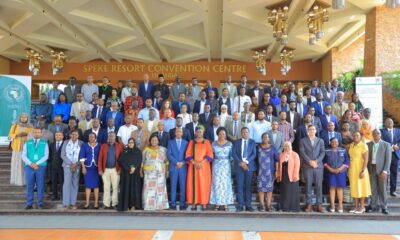Economy
Horticulture Sector Calls for Government Action Against Cartels and Exploitative Middlemen
Stakeholders in Uganda’s burgeoning horticulture sector are urging the government to swiftly intervene against the growing influence of cartels and exploitative brokers, whom they accuse of manipulating markets and shortchanging farmers.
The call for action was a key highlight at the National Horticulture Convention held today at the Serena Hotel in Kampala. Juliet Kyokunda, Country Director for TechnoServe Uganda, painted a stark picture of how these cartels inflate consumer prices while simultaneously driving down returns for farmers.
“We initially believed that directly linking farmers to markets would eliminate this problem,” Kyokunda explained. “However, we’ve since realised that middlemen are, in some cases, indispensable to the supply chain. Our current focus is on sensitising these middlemen and integrating them constructively into the sector to ensure fair practices.”
Kyokunda elaborated on TechnoServe’s efforts to counter traditional exploitative practices, where middlemen would dictate low prices to farmers lacking market information. By connecting exporters directly with farmers, establishing collection centres, and fostering contract farming, TechnoServe has improved information flow and quality standards, leading to better prices for farmers. While the influence of these exploitative middlemen has diminished, Kyokunda acknowledged their complete elimination might not be feasible.
The more formidable challenge, according to Kyokunda, lies with cartels possessing “high-level connections” who operate with impunity. Despite these difficulties, she expressed faith in the government’s capacity to intervene effectively if provided with specific information, urging them to lead reforms to rid the sector of these powerful groups.
Responding to these concerns, Peter Dhamuzungu, Principal Agricultural Officer in charge of cash crops at the Ministry of Agriculture, Animal Industry and Fisheries (MAAIF), told reporters that the government is considering a review of the current policy framework for the horticulture sector. This review aims to address a range of challenges, including the pervasive issue of cartels, counterfeit agricultural inputs, and limited market access for farmers.
“We urge those affected to identify specific cartels so the law can be enforced,” Dhamuzungu stated. “Our goal is to ensure a level playing field where all participants operate fairly within established guidelines. We are confident that with this information, the government can intervene effectively.”
Dhamuzungu further revealed that MAAIF plans to develop a comprehensive horticulture strategy and policy. This initiative will streamline objectives, clearly define roles for each stakeholder across the value chain, and improve regulations. “We anticipate these efforts will help mitigate current challenges and ensure operations align with our vision,” he said.
He also highlighted the significant challenges posed by the sector’s current uncoordinated nature, which contributes to the prevalence of unregulated improved varieties and increased susceptibility to pests and diseases. These issues, he noted, lead to “numerous interceptions, particularly impacting our export markets and, consequently, our national export earnings.”
Dhamuzungu reiterated MAAIF’s core objective of establishing a robust policy environment to guide stakeholders, resolve existing problems, and organise the sector more effectively, ultimately ensuring that all participants benefit from its growth.
Comments

























